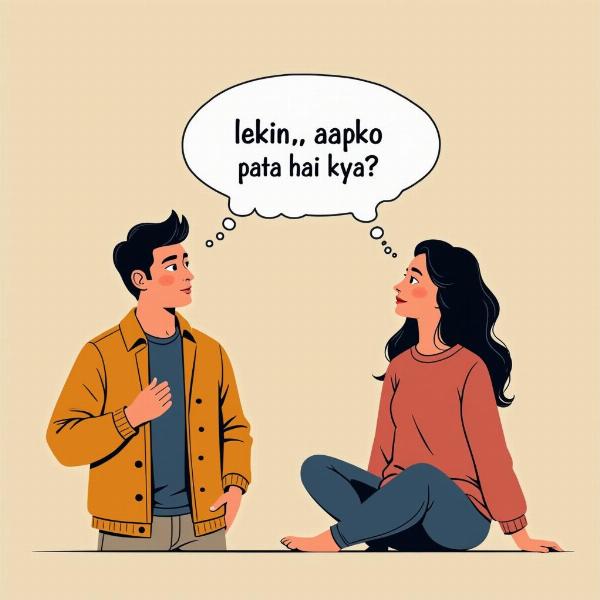Understanding the nuances of conversational phrases like “but you know what” can be tricky when learning a new language. While there isn’t a single perfect Hindi equivalent that captures the exact same meaning and tone, several options can effectively convey the sentiment depending on the context. This article will explore various ways to express “but you know what” in Hindi, delving into the cultural context and providing practical examples to help you communicate more naturally.
Different Ways to Say “But You Know What” in Hindi
“But you know what” often serves as a discourse marker, indicating a shift in thought or a desire to emphasize a point. It can express a range of emotions, from mild surprise to frustration or even excitement. Therefore, choosing the right Hindi equivalent requires considering the specific nuance you want to convey.
Expressing Contrast or Surprise
- लेकिन आपको पता है क्या (lekin aapko pata hai kya?): This translates directly to “but you know what?” and is generally suitable for expressing mild surprise or introducing a contrasting idea.
- पर जानते हैं क्या (par jaante hain kya?): A more informal version of the above, suitable for casual conversations.
- अरे सुनो (arey suno): Meaning “hey, listen,” this phrase can be used to grab attention and introduce a new thought, similar to “but you know what.”
Emphasizing a Point
- खैर, बात यह है कि (khair, baat yeh hai ki): Meaning “anyway, the point is,” this phrase effectively shifts the focus and emphasizes the following statement.
- सच तो यह है (sach toh yeh hai): This translates to “the truth is,” and can be used to highlight a crucial point, much like “but you know what” can preface a revealing statement.
Expressing Frustration or Resignation
- फिर भी (phir bhi): Simply meaning “still” or “nevertheless,” this can convey a sense of resignation or persistence despite a previous statement.
- चलो कोई बात नहीं (chalo koi baat nahi): Meaning “it’s okay” or “never mind,” this phrase can be used to dismiss a previous point and move on, sometimes with a hint of frustration.
 Hindi Conversation Example
Hindi Conversation Example
Choosing the Right Phrase for the Context
The best way to determine the appropriate Hindi equivalent of “but you know what” is to consider the context of the conversation. Are you trying to express surprise, make a strong point, or vent frustration? The surrounding conversation and your relationship with the listener will influence your choice.
For example, if you’re sharing an anecdote with a friend and want to introduce a surprising twist, you might use “लेकिन आपको पता है क्या (lekin aapko pata hai kya?)” or the informal “पर जानते हैं क्या (par jaante hain kya?).” However, in a more formal setting, or when expressing a significant point, “खैर, बात यह है कि (khair, baat yeh hai ki)” or “सच तो यह है (sach toh yeh hai)” might be more appropriate.
Understanding Cultural Nuances
While the literal translations can be helpful, understanding the cultural context behind these phrases is crucial for effective communication. In Hindi conversations, directness is sometimes softened with indirect language. Therefore, choosing a less literal but more culturally appropriate phrase can be beneficial. Observe how native Hindi speakers use these phrases in different situations to gain a deeper understanding.
Examples in Conversation
Here are some examples of how these phrases can be used in everyday conversations:
-
English: “I was planning to go to the market, but you know what? It started raining heavily.”
-
Hindi: “मैं बाजार जाने की योजना बना रहा था, लेकिन आपको पता है क्या? ज़ोरदार बारिश शुरू हो गई। (Main bazaar jaane ki yojana bana raha tha, lekin aapko pata hai kya? Zordaar barish shuru ho gayi.)”
-
English: “He said he couldn’t make it, but you know what? I saw him at the movies later.”
-
Hindi: “उसने कहा कि वह नहीं आ सकता, पर जानते हैं क्या? मैंने उसे बाद में फिल्मों में देखा। (Usne kaha ki woh nahin aa sakta, par jaante hain kya? Maine use baad mein filmo mein dekha.)”
Conclusion
While “but you know what” doesn’t have a single, perfect equivalent in Hindi, several phrases can effectively convey its meaning depending on the context. By understanding the nuances of each phrase and considering the cultural context, you can choose the most appropriate option and communicate more naturally in Hindi. Remember to listen to native speakers and observe how they use these phrases to refine your understanding and improve your fluency. Practicing these variations will help you express yourself more accurately and confidently in Hindi conversations.
FAQ
-
Is there a direct translation for “but you know what” in Hindi? While “लेकिन आपको पता है क्या (lekin aapko pata hai kya?)” is a direct translation, it might not always be the most appropriate choice depending on the context.
-
What’s the difference between “लेकिन आपको पता है क्या (lekin aapko pata hai kya?)” and “पर जानते हैं क्या (par jaante hain kya?)”? The latter is a more informal version suitable for casual conversations.
-
How can I choose the right phrase for the context? Consider the specific nuance you want to convey and the surrounding conversation.
Meaning-Hindi.in is your one-stop solution for all your Hindi translation needs. We offer a wide range of professional translation services, from business and legal documents to website localization and educational materials. Our team of expert Hindi linguists ensures accurate and culturally sensitive translations. Contact us today at [email protected] or call us at +91 11-4502-7584 for a free quote. Meaning-Hindi.in is dedicated to bridging the language gap and facilitating effective communication across cultures. We are committed to delivering high-quality translations that meet your specific requirements.